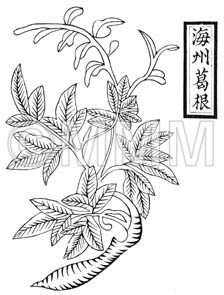Crude drug sample data base
※Click on the image to enlarge it.
The capital city, provincial capital city or the representative
location of its administrative area is indicated.
location of its administrative area is indicated.
30.592849
114.30553899999995
Production area information
People's Republic of China,Hubei Prov.
https://ethmed.toyama-wakan.net/img/pin_san.png
36.3418112
140.4467935
Collection information
Japan,Ibaraki Pref.
https://ethmed.toyama-wakan.net/img/pin_nyu.png
Scientific information data base
| Common name | 葛根, Gegen, Puerariae Radix (JP18), Puerariae Lobatae Radix (CP2020), Pueraria Root (JP18), Kudzuvine Root (CP2020) | |||||
|---|---|---|---|---|---|---|
| Synonyms | 板葛根, 角葛根, 粉葛根 | |||||
| crude drug image |
| |||||
| Original plant name | Pueraria lobata Ohwi, (Kuzu) | |||||
| original plant image |
| |||||
| Family name | Leguminosae | |||||
| Used part | root | |||||
| Quality for selection | Good Gegen is powder white and rich in amyloid. Neither brown nor fibrous one is good. Chinese Gegen is rich in amyloid and Japanese one is rich in fiber. (TN) | |||||
| Official compendium | JP XVIII, CP (2020 ed.) | |||||
| Clinical application | As a drug for diaphoresis, antifebrile and antispasmodic, gegen is applied for cough, fever, stiffness and pain of nape and back. It is the raw material for kuzudenpun (Jap. Name), or gegen starch. | |||||
| Medical system | Traditional Chinese medicine | |||||
| Drug effect in traditional medicine | Traditional classification | Diaphoretics with cold property | ||||
| Beneficial effect | [Property and Flavor] Cool; sweet and pungent. [Meridian Tropism] Spleen, stomach and lung meridians. [Actions] To release the flesh and reduce fever, engender fluid to quench thirst, promote eruption, upraise the middle qi to check diarrhea, unblock the meridian and activate collaterals, remove wine toxin. [Indications] External contraction with fever, headache, stiff and pain nape and neck, thirst, wasting-thirst, unerupted measles, heat dysentery, diarrhea, dizziness, headache, hemiplegia caused by wind-stroke, chest impediment, heart pain, wine toxin damaging the middle. | |||||
| Chemical constituent | Other aliphatic and related compounds (*C1): D-(+)-Pinitol Monosaccharides (*C1): D-Mannitol Polysaccharides (*C1): 澱粉 (starch polysaccharide) Isoflavones (*C1): Daidzin, Daidzein, Daidzein 4',7-diglucoside, Puerarin, Puerarin-7-xyloside, 4',6''-O-Diacetylpuerarin, Genistein, Formononetin, Kakkonein, Puerarol, Miroestrol Simple nitrogen containing compounds (*C1): Allantoin | |||||
| Chemical structure |
※画像をクリックすると、拡大して表示されます。 | |||||
| Pharmacological effect | Antipyretic,hyperglycemic (water extract).Spasmolytic (daidzein). | |||||
| DNA sequence | Traditioal Medical & Parmaceutical Database. | |||||
| Classical reference (Chinese Herbal Classic "Zhenglei bencao") |  ※Click this image to see the actual image ※Click this image to see the actual image | |||||
| Disease | Fever, Headache, stiffness in the back, Anhidrosis, Thirst, Muddy and watery stool, Diarrhea, Measles | |||||
| Formulation | Kakkonto, Kakkon'oren'ogonto, Kakkonkahangeto, Kakkonkaryojutsubuto, Kakkonkokato, Kakkontokashin'isenkyuto, Keishikakakkonto, Saikatsugekito, Shichimibyakujutsuto, Shakuyakushimotsugekito, Shomakakkonto, Jinsoin, Jintanto, Seiishakato, Zenshibyakujutsusan, Chikuyoto, Tokinentsuto, Dokkatsukakkonto, Bakumondoinshi, Hontonto, Hontonto, Hontonto, Hontonbukuryoto, Maogomito | |||||
| References | JP18: The 18th edition of the Japanese Pharmacopoeia. CP2020: Pharmacopoeia of the People's Republic of China 2020 edi. C1) The Encyclopedia of Wakan-Yaku with Color Pictures Vol. I, pp 163-164. | |||||
| Remarks | In China, not only Pueraria thomsonii Benth. but P. pseudo-hirsuta Tang et Wang may be found in the market. Taiwanese one is the root of P. montana (Lour.) Merrill. (JP. name: Taiwankuzu). The Japanese "kuzudenpun", which is obtained from its root, is the important ingredient for making "kuzuyu" (soup of starch kudzu). | |||||
| Last renewal date | 2025/09/01 | |||||












